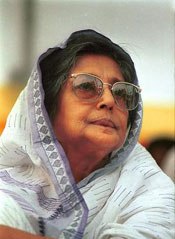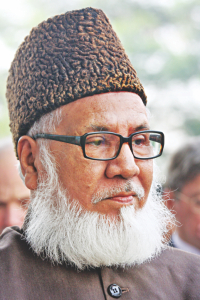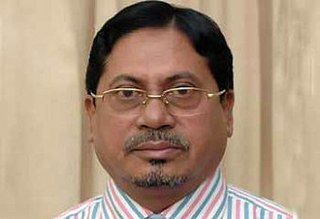
Jahanara Imam was a Bangladeshi writer and political activist. She is known for her efforts to bring those accused of committing war crimes in the Bangladesh Liberation War to trial. She has been called "Shaheed Janani".

Ghulam Azam was a Bangladeshi Islamist politician and a war criminal. He was the former leader of Bangladesh Jamaat-e-Islami, the oldest and the largest Islamic political party in Bangladesh.
Delwar Hossain Sayeedi was a Bangladeshi Islamist leader, politician, public speaker, and convicted war criminal, who served as a Member of Parliament representing the Pirojpur-1 constituency from 1996 to 2006.

Motiur Rahman Nizami was a politician, former Minister of Bangladesh, Islamic scholar, writer, and the former leader of the Bangladesh Jamaat-e-Islami. He is noted for leading the terror squad Al-Badr during the Bangladesh Liberation War. On 29 October 2014, he was convicted of masterminding the Demra massacre by the International Crimes Tribunal of Bangladesh. Nizami was the Member of Parliament for the Pabna-1 constituency from 1991 to 1996 and again from 2001 to 2006. He also served as the Bangladeshi Minister of Agriculture and Minister of Industry.
The Razakar was an East Pakistani paramilitary force organised by General Tikka Khan in then East Pakistan, now called Bangladesh, during the Bangladesh Liberation War in 1971.

Ali Ahsan Mohammad Mojaheed was a Bangladeshi politician who served as a Member of Parliament and as the Minister of Social Welfare from 2001 to 2007. He was executed in 2015 for war crimes committed during the 1971 Liberation war of Bangladesh.

Muhammad Kamaruzzaman was a Bangladeshi politician and journalist who served as the senior assistant secretary general of Bangladesh Jamaat-e-Islami and was convicted of war crimes during the 1971 Liberation war of Bangladesh. He was executed by hanging at Dhaka Central Jail at 22:01 on 11 April 2015.

Shahriyar Kabir(Bengali: শাহরিয়ার কবির; born 20 November 1950) is a Bangladeshi journalist, filmmaker, human rights activist, and author of more than 70 books focusing on human rights, communism, fundamentalism, history, and the Bangladesh war of independence. He was awarded Bangla Academy Literary Award in 1995.

Bangladesh Jamaat-e-Islami, previously known as Jamaat-e-Islami Bangladesh, is a major Islamist political party in Bangladesh.
Chowdhury Mueen-Uddin, is a British citizen convicted of war crimes committed during the Bangladesh Liberation War which involved the murder of Bengali intellectuals in collaboration with the Pakistan Army. After the liberation of Bangladesh, Chowdhury escaped from Bangladesh and attained British citizenship. Bangladesh has yet to file a request with the UK government to bring back Mueen, and the two countries do not have any extradition treaty signed between them.

The International Crimes Tribunal (Bangladesh) (ICT of Bangladesh) is a domestic war crimes tribunal in Bangladesh set up in 2009 to investigate and prosecute suspects for the genocide committed in 1971 by the Pakistan Army and their local collaborators Razakars, Al-Badr and Al-Shams during the Bangladesh Liberation War. During the 2008 general election, the Awami League (AL) pledged to try war criminals. The government set up the tribunal after the Awami League won the general election in December 2008 with a more than two-thirds majority in parliament.

The International Crimes Tribunal (ICT) is an ongoing tribunal in Bangladesh that aims to investigate and administer justice regarding the war crimes, crimes against humanity, genocide and crimes against peace committed by Pakistan army and their local collaborators Razakar, Al-Badr, Al-Shams during the Bangladesh Liberation War of 1971. In 2008's public election, one of the principal electoral manifestos of the Awami League was to initiate the trial process of war criminals. As promised, a member of parliament from Awami League submitted the proposal of the trial of war criminals on 29 January 2009 in National Parliament and the proposal was accepted unanimously. Finally after 39 years of Liberation of Bangladesh, on 25 March, the tribunal, attorney panel and investigation organization was formed for the trial of the ones accused of war crimes.
Abul Kalam Azad was a former Bangladeshi politician of the Jamaat-e-Islami, televangelist and convicted war criminal of the Bangladesh liberation war.

Abdul Quader Mollah was a Bangladeshi Islamist leader, writer, and politician of the Bangladesh Jamaat-e-Islami, who was convicted of war crimes and sentenced to death by the International Crimes Tribunal, Bangladesh (ICT) set up by the government of Bangladesh and hanged. The United Nations raised objections to the trial's fairness, while the general public in Bangladesh widely supported the execution.

On 5 February 2013, protests ignited in Shahbagh, Bangladesh, fueled by the call for the execution of the convicted war criminal Abdul Quader Mollah. Previously sentenced to life imprisonment, Mollah was convicted on five of six counts of war crimes by the International Crimes Tribunal of Bangladesh. Mollah supported the West Pakistan during the 1971 Bangladesh Liberation War and played a crucial role in the murder of numerous Bengali nationalists and intellectuals. The demonstrations also sought the government's ban on the radical right-wing and conservative-Islamist group, Jamaat-e-Islami from participating in politics, including elections, and a boycott of institutions supporting or affiliated with the group.
2013 (MMXIII) was a common year starting on Tuesday of the Gregorian calendar, the 2013th year of the Common Era (CE) and Anno Domini (AD) designations, the 13th year of the 3rd millennium and the 21st century, and the 4th year of the 2010s decade.
The 2012 ICT Skype controversy was the leaking of Skype conversations and emails between Mohammed Nizamul Huq, head judge and chairman of Bangladesh's International Crimes Tribunal, and Ahmed Ziauddin, a Bangladeshi lawyer based in Brussels. These conversations took place during the prosecution of the accused for alleged war crimes during the Bangladesh Liberation War in 1971.
The Bangladesh Collaborators Order, 1972 is a law enacted in 1972 by the Government of Bangladesh to establish a tribunal to prosecute local collaborators who helped or supported the Pakistan Army during the Bangladesh Liberation War and the 1971 Bangladesh genocide. An estimated 11,000 collaborators were arrested. An estimated 2,884 cases were filed at the tribunal until October 1973. Of those accused, 752 received sentencing. Many detainees were released after the 15 August 1975 Bangladeshi coup d'état.
Maulana Abul Kalam Muhammad Yusuf was a Bangladeshi religious scholar, writer, activist and politician. Yusuf was a specialist in the study of Hadith : he earned the title "Mumtaz al-Muhaddethin" for his advanced degree in hadith sciences, and has also published books widely in the field.
Gono Adalat was a mock trial held to Bangladesh of those responsible for the 1971 Bangladesh Genocide. It was not an official trial and did not have any legal basis but was widely popular. The Bangladesh Nationalist Party led government filed cases against the organizers of the Gono Adalat which were withdrawn by the next caretaker government. The trial was led by Jahanara Imam.











